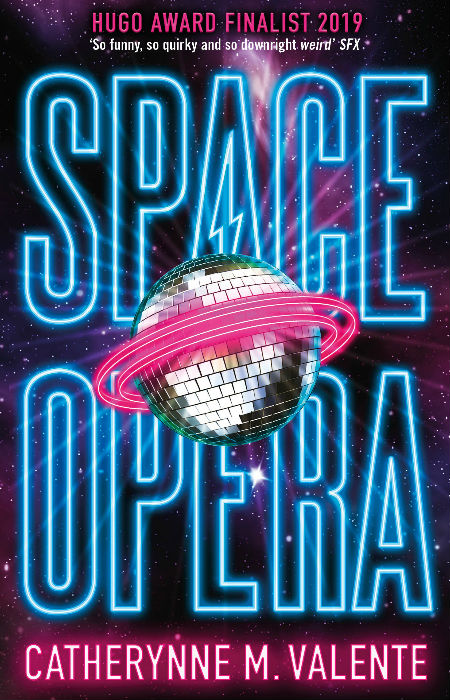
Way back on 12 September in 1962, President John F. Kennedy announced that humanity, well, Americans really were going to the moon:
We choose to go to the Moon! We choose to go to the Moon…We choose to go to the Moon in this decade and do the other things, not because they are easy, but because they are hard; because that goal will serve to organize and measure the best of our energies and skills, because that challenge is one that we are willing to accept, one we are unwilling to postpone, and one we intend to win, and the others, too. (source: Wikipedia)
Frans, inspirational words indeed, and ones befitting an intent as grand and visionary as the one he proposed; but would he have been so willing to head out into the cosmos, even to our nearest celestial neighbour, if he had really understood what he, and by extension, the human race were really getting into?
Possibly not, which is why has-been glam-rock musician Decibel Jones aka Danesh Jalo is simply whisked away after aliens, in the form of a “big blue bird”, a race known as the Esca, appear at once to every person on earth, announcing that we are not alone, that there’s a galactic community out there, and that we have been wanting, sentience-wise and must be destroyed.
Wait … what?
The one escape clause is this whole not-ET mess? That we can escape out sentence of civilisitional extinction if we simply appear at the Grand Prix, a galactic equivalent to the Eurovision Song Contest, and sing our little hearts out.
“Life is beautiful and life is stupid. This is, in fact, widely regarded as a universal rule not less inviolable than the Second Law of Thermodynamics, the Uncertainty Principle, and No Post on Sundays. As long as you keep that in mind, and never give more weight to one than the other, the history of the galaxy is a simple tune with lyrics flashed on-screen and a helpful, friendly bouncing disco ball of all-inhabiting flames to help you follow along.
This book is that disco ball.
Cue the music. Cue the lights.” (PP. 4-5)
Simple, right?
Well, not so much; for one thing, Decibel Jones hasn’t written a song in years, and that was after a less-than-successful solo album, he hasn’t spoken to the one surviving band member, Oort St. Ultraviolet, of his old outfit, the Absolute Zeros in years, and he might be a little traumatised by past events involving a spurned marriage proposal from their lead singer, Mira.
It’s one hell of a dizzylingly off-the-wall, and in Space Opera, Catherynne M. Valente, makes the absolute most of it, going to town, or is that a planet, on a story that gloriously and fabulously parodies (with great affection) Eurovision, band life, human ambition, and the cosy idea we sometimes (when we don’t imagine them invading and killing us all) that aliens are more advanced than us and just want peace, love and mutually-beneficial robots.
As premises go, it’s fantastically outlandish, and there are so many ways it could have gone wrong, but Valente nails it with gleeful aplomb, channeling the spirit of Douglas Adams while creating something undeniably, hilariously and yes, even movingly, her own.

In passages that sometimes get a little too long and twisted for their own good but are stuffed full of incredibly clever ideas and phrases so perfect, you want to memorise them all to rattle off, impressively hopefully at parties – “They have all the natural defenses of a pillow in a tiger enclosure” (a description of a flowery race known as the Klavaret) – Valente executes masterfully on the idea that we are mightily fucked up, but that even more alarmingly, so are all our extraterrestrial neighbours.
The Voorpret, for instance are sentient zombifying viruses who exist by inhabiting, en masse, the bodies of deceased people from a multitude of races, to sometimes uncomfortable effect, while the Alunizar are ancient, arrogant and spectacularly-successful empire builders who spent eons lying about the fact that they invented (they didn’t) wormholes).
They, and a host of other races all went to war at one point, doing so much damage, as wars are wont to do, that they created the Metagalactic Grand Prix, a singing competition par excellence to ensure that the only sounds heard after the conflagration ended in the city of Vlimeux on the watery, happy planet Listot would be singing and the playing of multitudinous, and not all pleasing to the ear, music.
A thoroughly laudatory and idealistic idea that has a corollary in, you guessed it, the Eurovision Song Contest which Valente, in her acknowledgements, affectionately points out is a “hopeless and ridiculous” notion that is also delightfully “sublime”.
She has a great deal of fun with the idea of war and its aftermath being met with song, poking happy holes in everything about the idea while acknowledging what genius it is too.
“The thirtieth Metagalactic Grand Prix was held on Otozh, a gravitationally down-for-anything ball of a world just close enough to the supermassive black hole at the centre of the galaxy to make popping down to the event horizon for a carton of relativity a snap without having to constantly worry about whether your front garden is about to become one with the singularity.” (P. 172)
A relatively-recent convert to the glitter and fabulousness of Eurovision, Valente clearly loves it, with Space Opera, all clever asides, witty oneliners, breathtakingly quirky imaginative leaps and unexpected humanity (yep, even among the aliens), used an exploration of how a “ridiculous” idea can success brilliantly in (largely) keeping Europe free of war for over 70 years.
In doing so, she also deep dives into the fickle nature of musical fame and fortune, and indeed, what it means to be human, an incisively-executed element in the novel that lends its gloriously-good, very clever silliness some real emotional substance and heart.
All comedy should, of course, do that, but not all comedy does, and Valente takes the idea and runs with it, offering up a tale that is crazily preposterous on one hand, but deeply-affecting on another.
These two seemingly-disparate parts of the whole sitting cosily well next to each other, as Space Opera plays a will-they, won’t-they game with our fate, wondering if our newly-revealed, incredibly fallible galactic neighbours will spare ur or not, and whether we are, after all, sentient enough. and by extension kind and civilised enough to deserve the gift of continued existence.
It’s wonderfully-intense musing set against sci-fi comedy so richly-realised that you’ll gasp in admiration at Valente’s imaginative reach and deft execution, and keep reading, not simply because you want to see how we fare, but also because books this good cannot help but be read compulsively and with a huge grin on your face, all the while hoping that the galaxy out there isn’t as batshit crazy as the author postulates it might be.